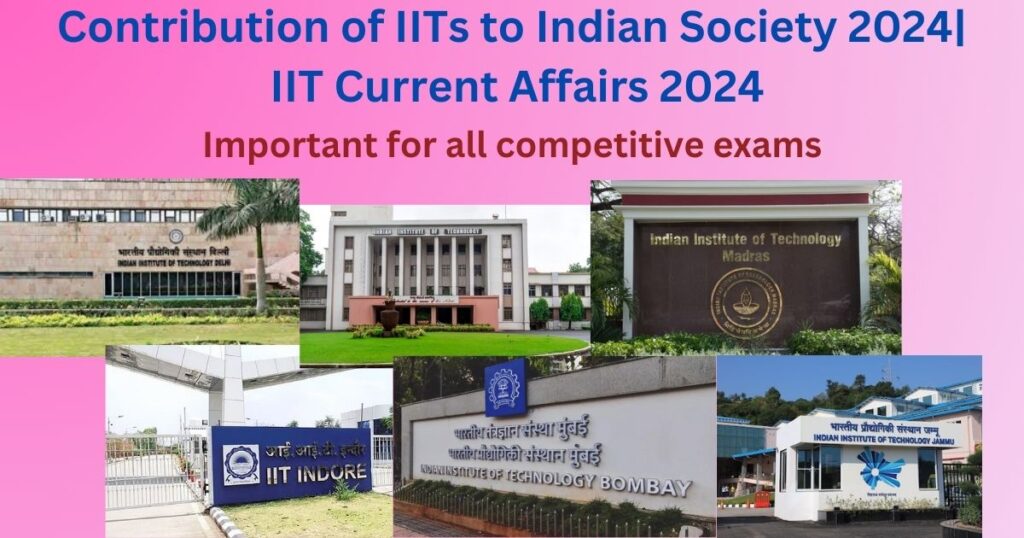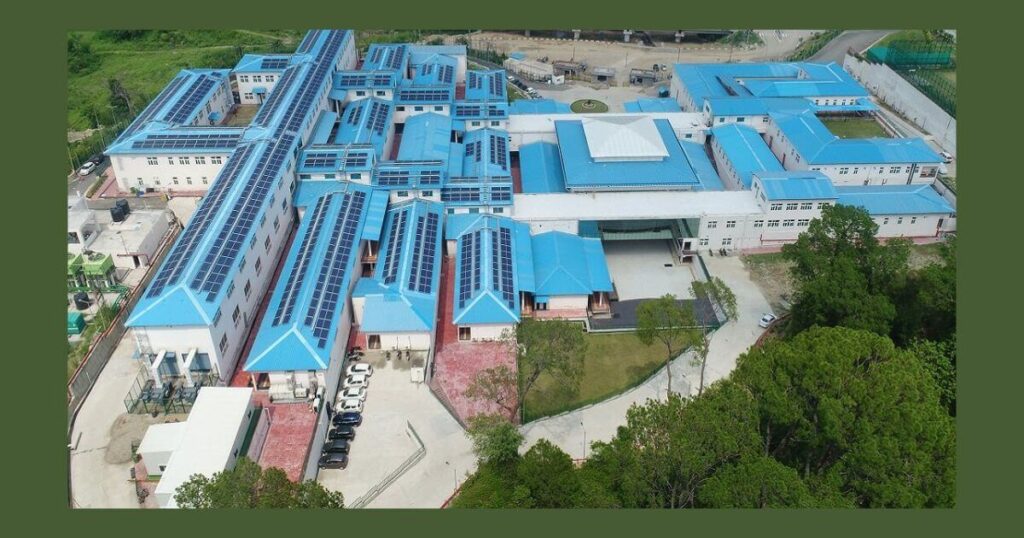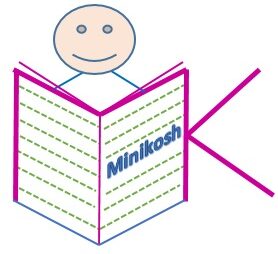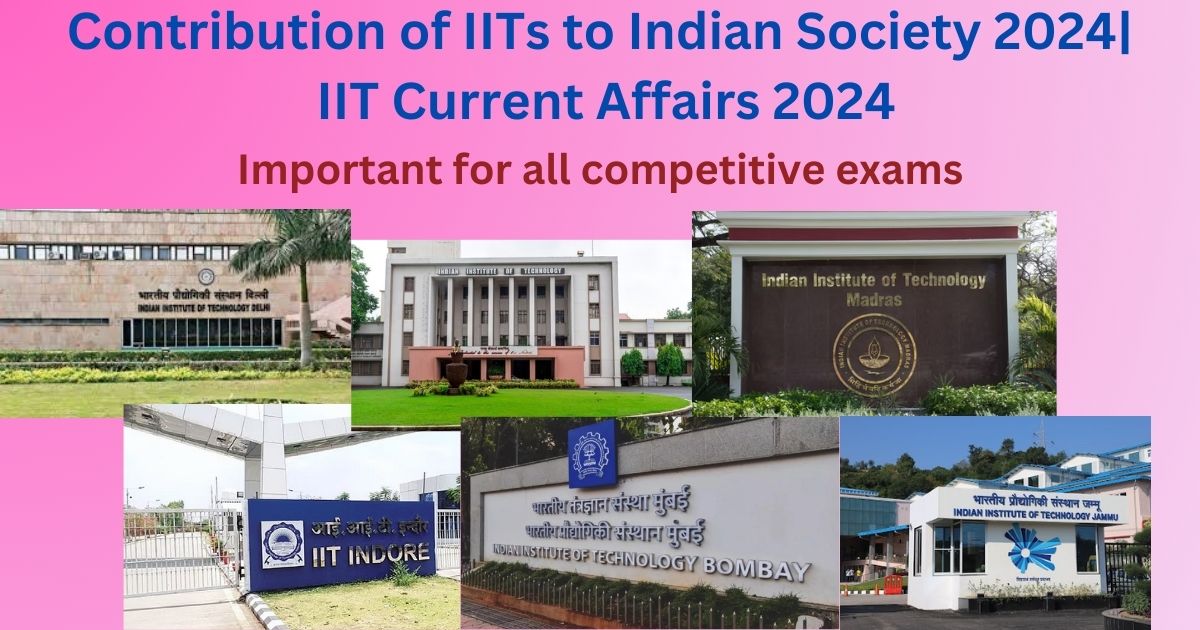
Contribution of IITs to Indian Society 2024| IIT Current Affairs 2024 (Important for all competitive exams.)
Explore the significant contributions of IITs to Indian society in 2024. Stay updated with the latest IIT current affairs.
Table of Contents
All India Research Scholar’s Summit 2024
The key objective of the All India Research Scholar’s Summit (AIRSS) 2024 was to discover the developments in several research domains presented through poster sessions, presentations and prototype or product demonstration. This Summit was hosted by the Institute of Technology (IIT) Madras in March 2024.
Investor Information & Analytics Platform for the startups
An ‘Investor Information and Analytics Platform’ developed by Centre for Research on Start-Ups and Risk Financing (CREST) has been inaugurated by the Union Minister Rajeev Chandrasekhar along with Prof. Thillai Rajan A of Indian Institute of Technology Madras.
It enables various features such as involvement of AI for easy navigation, various government schemes, investor networks, seamlessly information access for entrepreneurs. Also with CREST this provides advancement in developing devices, services and platforms for India and outside.
IIT’s researchers engineer plant cells to produce drug for cancer
Researchers from recognized Institutions which are the Indian Institute of Technology Madras and Mandi have magnificently and metabolically planned the plant cells to enhance the production of the anti-cancer drug Camptothecin (CPT).
Basically, CPT is extracted from Nathapodytes nimmoniana which is one of the endangered plants. This innovation by the researchers of IITs comes as a critical one to both plant conservation as well as medical production.
Tamper-proof signaling system based on blockchain technology
The researchers of the Indian Institute of Technology, Kharagpur from the Electrical and Electronics Engineering (EEE) branch are developing a tamper-proof signaling system to enable safe and efficient operations for the Indian Railways.
This tamper-proof signaling system is based on blockchain technology which is a decentralized system that ensures security, integrity and immutability of recorded data. This technology is mainly used in banking and cryptocurrency transactions and it has the capability of keeping data safe without being hacked, tampered or manipulated.
It is different from the existing Data logger because the Data loggers has limitation of centralization, limited access control and data integrity. The blockchain technology overcomes these limitations and provides secure, transparent and improved data integrity.
IIT Kanpur & Indian Navy to promote Technology Development
A Memorandum of Understanding (MoU) has been signed by the Indian Institute of Technology Kanpur and Indian Navy at the Naval Headquarters. Professor S. Ganesh, Director of the IIT Kanpur and Rear Admiral K Srinivas, Asst. Chief of Material (Dockyard & Refits), officialized this partnership to encourage defense proficiencies through technological and academic abilities.
The preliminary aim of this collaboration is to focus on Research and Development initiatives to introduce technological innovations to minimize the complexities faced by the Indian Navy. For this purpose, teams of Center of Excellence from Marine Engineering at INS Shivaji, Lonavla and IIT Kanpur jointly working on the projects.
Metal ‘Tantalum’ in Sutlej River, Punjab
A revolutionary innovation has been done by researchers from Indian Institute of Technology (IIT), Ropar, led by an assistant professor at Civil Engineering Department of institute Dr. Resmi Sebastian. The team has recognized a rare metal’s presence namely tantalum in the Sutlej River sand at Punjab.
Tantalum metal has atomic number 73, and having characteristics: heavy, Grey and high Corrosion resistant because of stubborn oxide layer formation when exposed to air.
Capacitors made from the tantalum can store more energy with minimum leakage and compared to smaller sizes compact size which is suitable to use in portable devices of electronics such as laptops, smartphones and digital cameras.
Its high melting point enables it to be used in chemical plants, airplanes, nuclear power plants and missiles.
India’s Largest Drone Pilot Training Organization
Indian Institute of Technology Guwahati, in collaboration with EduRude, has inaugurated India’s Largest Remote Pilot Training Organization (RPTO).
The objective of this innovative drone training program is to provide three months’ dedicated training for Junior Commissioned Officers (JCOs) and other officers for modernizing the armed forces’ operations.
Sound-Based Anti-Drone System– IIT Jammu

Professor Karan Nathwani from IIT-Jammu has created a groundbreaking anti-drone system that relies on sound technology. This innovative approach ensures affordability and user friendliness.
India’s inaugural 155 Smart Ammunition

Indian Institution of Technology Madras (IIT Madras) and Munitions India Limited have joined forces to pioneer the development of 155 Smart Ammunition. This groundbreaking collaboration underscores a concerted effort towards achieving indigenization in the Defence sector.
IIT Bombay ranks first in Indian universities in QS Asia University Rankings 2024
IIT Bombay (40) and IIT Delhi (46) showcased their academic strength by securing positions within the top 50.
India proudly boasts the highest number of universities featured in the QS Asia University Rankings 2024, with a total of 148. This marks a substantial increase of 37 from the previous year.
Peking University of China retain the top rank in Asia for the second consecutive year.
The University of Hong Kong (HKU) and the National University of Singapore (NUS) claimed the second and third spots, respectively.
Central Government Approval to IIT Satellite Campus
Dr. Mohan Yadav the CM of Madhya Pradesh has given approval to IIT Indore’s Ujjain Satellite campus, marking a essential moment for education and skill development. With approval from Union Education Minister Dharmendra Pradhan, this step introduces significant benefits for the region.
The First Detailed Project Report (DPR) has been drafted by IIT Indore for launching a satellite center in Ujjain. Spanning 100 acres, it will focus on international-level research and advanced education.
New Campus in Kandy, Sri Lanka
The Indian Institute of Technology Madras is establishing a new campus in Kandy, Sri Lanka. This step is a substantial enhancement in collaboration between India and Sri Lanka.
This initiative will create opportunities for Sri Lankan students to get technical education of international standards more affordable within their country. Along with this, it will also enable the cultural and educational exchange between the two countries, developing strong bilateral relations.
Lieutenant General Kanwal Jeet Singh Dhillon appointed as chairperson Board of Governor
Retired Lieutenant General Kanwal Jeet Singh Dhillon has been appointed as the Chairperson of Board of Governors of the Indian Institute of Technology, Mandi (IIT-Mandi). He was also the former head of the Army’s strategic 15 Corps during most challenging surroundings of 2019 Pulwama IED blast, abrogation of articles 370 and 35A.
Lt Gen (Retd) Kanwal Jeet Singh Dhillon (Tiny Dhillon) has been appointed as the Chairperson of the Board of Governors (BoG) of the Indian Institute of Technology, Mandi, Himachal Pradesh for a period of three years w.e.f. 25.08.2023 by President Droupadi Murmu. pic.twitter.com/KFVBCWOn9D
— The Times Of India (@timesofindia) August 27, 2023
Also Visit:
https://minikosh.com/education-icc-u19-mens-cricket-world-cup/
https://minikosh.com/wpl-2024-current-affairs-2024/
For informative Videos/Shorts/Quiz
Visit: www.youtube.com/@minikosh-com

